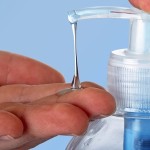
The U.S Food and Drug Administration (FDA) today proposed a federal rule that, if finalized, would remove the potentially hazardous chemical triclosan from antibacterial body washes and hand soaps.
Under the proposed rule, the FDA will require manufacturers to prove their antibacterial soaps and body washes are safe and more effective than plain soap and water. If companies cannot demonstrate the safety and effectiveness of their products, they would have to be reformulated, relabeled or possibly removed from the market.

FDA first proposed to remove triclosan from certain consumer products in 1978. The chemical, a suspected endocrine disruptor, has been linked to reproductive and developmental harm in laboratory studies.
The agency took no final action, however, and triclosan has been widely used in antimicrobial soaps sold in the U.S. In April 2010, the FDA acknowledged soaps containing triclosan offer no additional benefit over regular soap and water.
In 2010, the Natural Resources Defense Council (NRDC) sued the FDA to force the agency to issue a final rule. As part of a settlement signed last month, the agency proposed a new final rule today and committed to taking final action by 2016.
“This is a good first step toward getting unsafe triclosan off the market,” Mae Wu, an attorney in the NRDC health program, said in a media release. “The FDA is finally taking concerns about triclosan seriously. Washing your hands with soap containing triclosan doesn’t make them cleaner than using regular soap and water and can carry potential health risks.”
The growing use of triclosan in products during the past few decades has led to widespread residues in the environment and in people. Bio-monitoring results found residues of triclosan in 75 percent of Americans older than age of six. The chemical is absorbed through contact with the skin and tests have found it in human blood, urine and even breast milk.
Laboratory studies have shown that triclosan is an endocrine disruptor capable of interfering with hormones critical for normal development and reproduction. Such hormonal interference has the potential to cause long-term health problems including poor sperm quality and infertility and damage to the developing brain leading to poor learning and memory.
Several studies suggest that triclosan also may contribute to the development of antibiotic-resistant bacteria, may exacerbate allergies and may weaken muscle function.
Visit EcoWatch’s HEALTH page for more related news on this topic.


Leave a Reply
You must be logged in to post a comment.